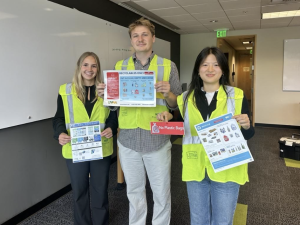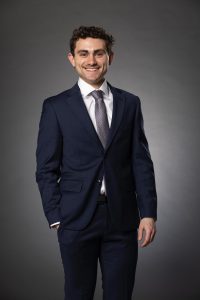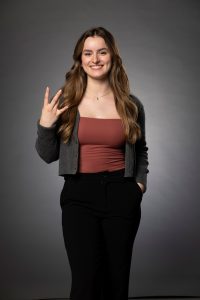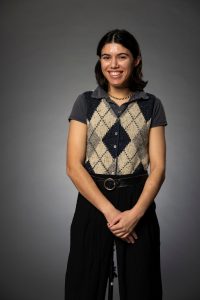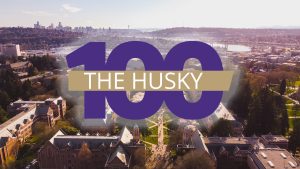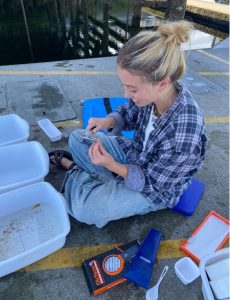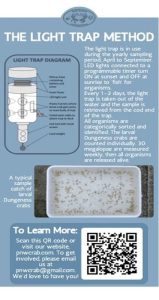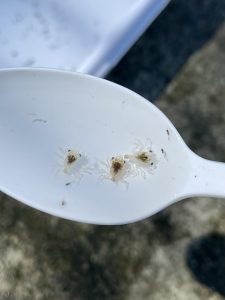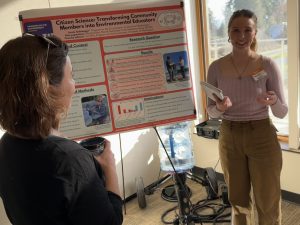The Program on the Environment will host the Autumn 2025 Capstone Symposium on Tuesday, November 25th (online) AND on Tuesday, December 2nd (in person) at the UW School of Aquatic Fisheries & Science. All are welcome to attend and support students as they present on the culmination of their hard work over three quarters.
The Capstone Course Series is a highlight for many students, and serves to catapult some into their first jobs or even their dream careers. Through internships, research, and social media training, students come out of the experience well equipped to communicate about the problem they sought to solve, and to tie their academic learning with specific research questions.
The online event is open to the public, and we encourage students interested in learning about the Capstone, as well as members of the community, to join us. The in-person event is reserved for students & members of the UW community, but we encourage alumni to reach out for ways to be involved through volunteering.
Autumn 2025 Symposium Schedule
Day 1: Online Poster Symposium (Tuesday November 25th)
4:30 PM – 4:40 PM Welcome & Session Overview
4:40 – 4:50 PM Session A Speaker Intros
4:50 – 5:50 PM Poster Session A — Communicating Change and Building Sustainable Communities
| Claire Abrahamson (Room #1): Knocking for Change: Turning Awareness Into Action Through Environmental Canvassing. Site Partner: Environment Washington |
| Benny Bassli (Room #3): Designing Effective Nature Camp Curricula: Educator Preparation, Reflection & Developmental Alignment in Environmental Education. Site Partner: Stroum Jewish Community Center |
| Zjada Baydass (Room #4): Integrating Nature-Based Practices to Improve Athlete Well-Being and Performance: Reimagining Sports Culture Beyond the Scoreboard. Site Partner: The Nature Project |
| Sophia Bender (Room #5): Climate Collaboration: How Jurisdictions Can Strengthen Local Climate Action. Site Partner: Pierce County Planning and Public Works |
| Allyson Chelsy (Room #6): Bring or Borrow: A Sustainable Choice Made Daily. Site Partner: City of Bothell |
| Elizabeth Coughlin (Room #7): The Future Of The Streetcar: The Culture Connector. Site Partner: Seattle Subway Foundation |
| Savanah Crelencia (Room #8): Measuring What Matters: ROI and Partnerships for Small Non Profits. Site Partner: Seattle REconomy |
| Kaylin Datwyler (Room #9): Environmental Education Resources: How to make Children’s Books more Accessible and Engaging? Site Partner: Collaborative for Socio-Ecological Engagement (CoSEE) |
| Jackson Enquist (Room #10): Reducing Waste at the Source: A Community Based Framework for Sustainable Waste Management. Site Partner: RePurpose Whidbey |
| Rashmi Gaitonde (Room #11): The Impact Loop – Bridging the Green Gap Through Data Visualization in Secondhand Fashion. Site Partner: InTheLoop, Inc |
| Ethan Hynes (Room #12): This is how we Cool It: Comparing Heat Planning and Heat Response in Pierce County. Site Partner: Pierce County Council |
| Gaoda Lu (Room #13): Don’t Just Read the Sign: Why Hospital Staff Still Trash Recycling and How to Fix It With Your Hands. Site Partner: Harborview Medical Center |
| Scout McHugh (Room #14):On the Right Track: Addressing the Barriers in Non-Profit Organization Collaborations. Site Partner: Seattle REconomy |
| Mirabella Miranda (Room #15): Every Drop Counts: The Relationship Between Seattle’s Water Utilities and Greenhouse Gas Emissions. Site Partner: Seattle Public Utilities |
| Malia Page (Room #16): Exploring Future Possibilities: Reusable Isolation Gowns at Harborview. Site Partner: Harborview Medical Center |
| Samarth Sarin (Room #17): Bridging Policy and Practice: Evaluating Washington State’s Greenhouse Gas Reduction Strategies in Comparison to Other U.S. Frameworks. Site Partner: Seattle Public Utilities |
| Gwen Schwenk (Room #18): Green, but Going Nowhere: Understanding and Addressing the Legal, Financial, and Digital Challenges Facing Sustainable Small Businesses in Puget Sound. Site Partner: UW Bothell and Cascadia College |
| Cassia Vinci (Room #19): Atoms and Inequities: Exploring the Demographic Divide in Nuclear Understanding. Site Partner: Central Plateau Cleanup Company |
| Callista Walla (Room #20): CTRL + Recycle: Making Digital Zero Waste Resources Accessible. Site Partner: rePurpose Whidbey |
| Chelsea Whiting (Room #21): Footprint & Future: Evaluating the Environmental and Transformative Impacts of Eco Study Abroad Trips. Site Partner: UW Program on the Environment |
| Ella Wilks (Room #22): From Data to Dialogue: Sustainability Communication That Drives Lasting Change. Site Partner: Sound Transit Sustainability Department |
5:50 – 6:00 PM Break
6:00 – 6:05 PM Session B OVerview
6:05 – 6:15 PM Session B Speaker Intros
6:15 – 7:15 PM Poster Session B — Restoring Systems and Reimagining Relationships with Nature
| Addison Butler (Room #1): Expanding Environmental Education through Community Science Activities: Lessons from UW Botanic Gardens Summer Camp. Site Partner: UW Botanic Gardens |
| Grace Cui (Room #2): Broadening Participation in Green Stormwater Infrastructure: Customizing RainWise Outreach through Community Lifestyles, Cultures, and Interests. Site Partner: Sustainable Ballard |
| Leyna Doty (Room #3): Bridging the Gap: Soil Remediation and Equitable Communication in Contaminated Community Gardens. Site Partner: InterIM CDA |
| Flora Eagan (Room #4): Driven to Nourish: Analyzing Accessibility Barriers in Mobile Food Distribution. Site Partner: FareStart |
| Ashlynn Harris (Room #5): Let’s Break it Down: Barriers & Benefits of Community Compost Programs. Site Partner: City of Camas |
| Kaiis Jarrahy (Room #6): Regional Survey of Western Sword Fern (Polystichum munitum) Mortality In The Puget Lowlands. Site Partner: Seward Park Forest Steward |
| Haylee Jarrett (Room #7): Clearing the Air: Uncovering Wildfire Smoke Safety Communication for Spanish-Speaking Agricultural Workers. Site Partner: Pacific Northwest Agricultural Safety and Health Center, UW |
| Yuchen Jiang (Room #8): Cultivating Equity: Sustainable Urban Fruit Harvesting for Waste Reduction & Community Benefit. Site Partner: City Fruit |
| Clare Larsen (Room #9): The Control on Food Security Distribution and Environmental Education. Site Partner: FareStart |
| Kate Li (Room #10): From Curiosity to Care: How Informal Science Inspires Marine Conservation Behavior. Site Partner: Highline College MaST Center |
| Maren MacDonald (Room #11): Anchor Management: AIS Insights Across the San Juan Islands. Site Partner: UW Friday Harbor Labs |
| Mara Munkhjargal (Room #12): Storytelling as Empowerment: Bridging Scientific Knowledge and Youth Action through Sustainability Ambassadors in King County. Site Partner: Sustainability Ambassadors |
| Shauntaya Parker (Room #13): Reviving Kitsap: Engaging Diverse Volunteers In Kitsap County Litter Cleanups. Site Partner: Kitsap County Solid Waste Department |
| Ava Potter (Room #14): Reef Response: Impacts of Marine Heatwaves and Urchin Herbivory on Hawaiian Coral Reef Health and Restoration. Site Partner: Seattle Aquarium |
| Matthew Schwarzenbach (Room #15): Repetition and Retention in Informal Conservation Learning: A Study of Marine Mammal Education Programs. Site Partner: Highline College MaST Center Aquarium |
| Udith Sreejith (Room #16): Analyzing Changes in Coral Cover in West Hawai‘i Following Marine Heatwaves. Site Partner: Seattle Aquarium |
| Sophie Stetkiewicz (Room #17): Farmer Influencers? Social Media & The Promotion of Local Food. Site Partner: Whidbey Island Grown Cooperative |
| Noah Tinson (Room #18): Future-Proofing Ecological Restoration: Navigating the Climate Crisis on a Local Scale. Site Partner: Grassroots Ecology |
| Ana Underberg (Room #19): Promoting Human–Wildlife Coexistence through Environmental Education: Evaluating Outreach Effectiveness at PAWS. Site Partner: Progressive Animal Welfare Society (PAWS) |
| Brigitte Worstell (Room #20): Adverse Selection and Equity in the Voluntary Carbon Market: Balancing Integrity and Inclusion in Global Climate Finance. Site Partner: Environmental Defense Fund |
7:15 – 7:30 PM Closing Remarks
Day 2: Oral Presentation Symposium & Celebration (In-person, Tuesday December 2nd)
UW School of Aquatic & Fishery Sciences | 1122 NE Boat St, Seattle WA 98105
4:30 – 4:40 PM Welcome & Housekeeping
4:40 – 4:45 PM Session Introduction: Learning, Leading, and Storytelling for Change
| 4:45 PM | Olivia Brune: Exploring Educators’ Needs for Place-Based Scientific Inquiry. Site Partner: Pierce County Public Works Department |
| 4:53 PM | Silvia Caralas: Youth-Led Sustainable Community Development: As Easy As ABCD+E. Site Partner: Sustainability Ambassadors |
| 5:01 PM | Andia Kaufman: Cultivating Curiosity and Connection: Integrating Naturalist-Intelligence-Based Learning into University of Washington Botanic Gardens (UWBG) Educational Programs. Site Partner: UW Botanical Gardens |
| 5:09 PM | Makenzie Edmond: The Lorax, Dorceta Taylor, and Me: How Film Perpetuates Environmental Racism. Site Partner: Basilica Bio |
| 5:17 PM | Claire Farber: Accessible and Attractive Science: A Case Study in the Chehalis. Site Partner: Chehalis Basin Partnership |
| 5:25 PM | Peter Kelleher: Reimagining Industrial Waterfronts as Blue Urban Third Spaces. Site Partner: Walrus Boat Recycling |
5:33-5:45 PM Intermission
5:45 – 5:50 PM Session Introduction: Working the Land: Food, Labor, and Environmental Justice
| 5:50 PM | Tash Drewry: Protein with a Purpose: Evaluating How Local Nutrition Assistance Programs can “Meat” Community Needs. Site Partner: Pike Place Market Commons |
| 5:58 PM | Kaija Koenigberg: Soil, Bugs, & Rock ‘N’ Roll: In-Soil Invertebrates as Bioindicators of Cultivated Soil Fertility. Site Partner: SkyRoot Farm |
| 6:06 PM | Stephanie Lopez-Jaime: “I made $70 in one day working in extreme heat”: Oral Histories and Consumer Perceptions in the Struggle for Farm Workers Rights and Environmental Accountability. Site Partner: UFW Foundation |
| 6:14 PM | Ariana Milo: Cultivating Belonging: Accessibility and Inclusion at the UW Farm. Site Partner: UW Farm |
| 6:22 PM | Ava Vaughan: Strengthening Resilience In Washington’s Coastal Communities: Integrating Social Vulnerability Into Regional Hazard Mitigation Planning. Site Partner: Washington Sea Grant |
6:30 – 6:40 PM Intermission
6:40 – 6:45 PM Session Introduction: Restoring Ecosystems and Rethinking Sustainability
| 6:45 PM | Jami Norris: Buzzy Bees: Altering Ecological Literacy in Homeowners Through the Creation of Pollinator Gardens. Site Partner: Pollinator Pathway Northwest |
| 6:53 PM | Ava Potter: Reef Response: Impacts of Marine Heatwaves and Urchin Herbivory on Hawaiian Coral Reef Health and Restoration. Site Partner: Seattle Aquarium |
| 7:01 PM | Ben Schlipp: Proving an Invisible Die-Off: Finding the Extent of the Pacfic Northwest Sword Fern Die-Off. Site Partner: Friends of Seward Park |
| 7:09 PM | Riley Spahr: Bodies of Water: Human Perceptions and Connections to Environmental and Coastal Consequences. Site Partner: University of Washington |
| 7:17 PM | Maisie Walker: Swinging Toward Sustainability: Shaping the Future of Golf. Site Partner: Friends of the Port Townsend/Camas Prairie Park |
| 7:25 PM | Alyssa Adair: From Aspiration to Impact: Understanding Barriers to Organizational Sustainability. Site Partner: UW Housing and Food Services |
7:38 – 7:45 PM Closing Remarks
7:45 – 8:30 PM Poster Highlights** & Reception in the Lobby
**Note: the judges will choose 10 posters from Day 1, which will be printed out and displayed during day 2. Those poster authors will be invited to present their posters during the reception.
